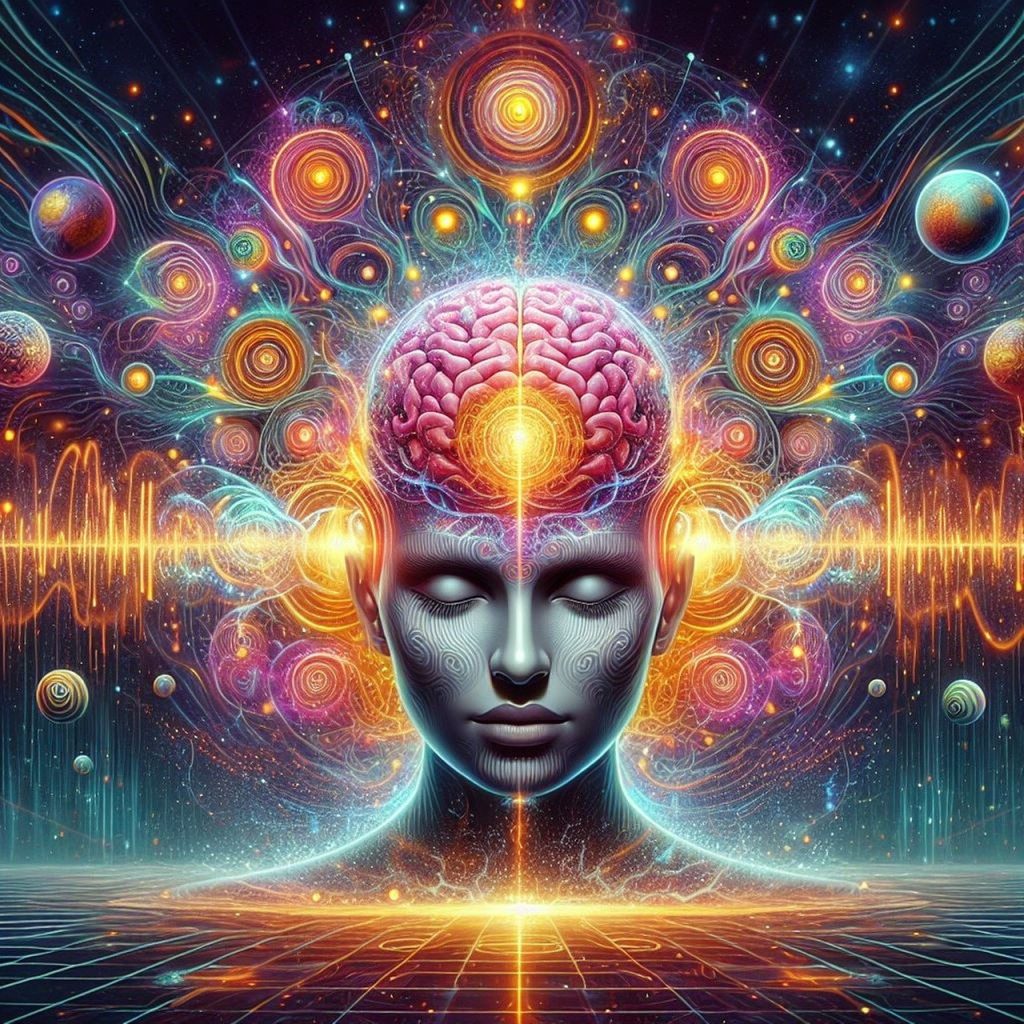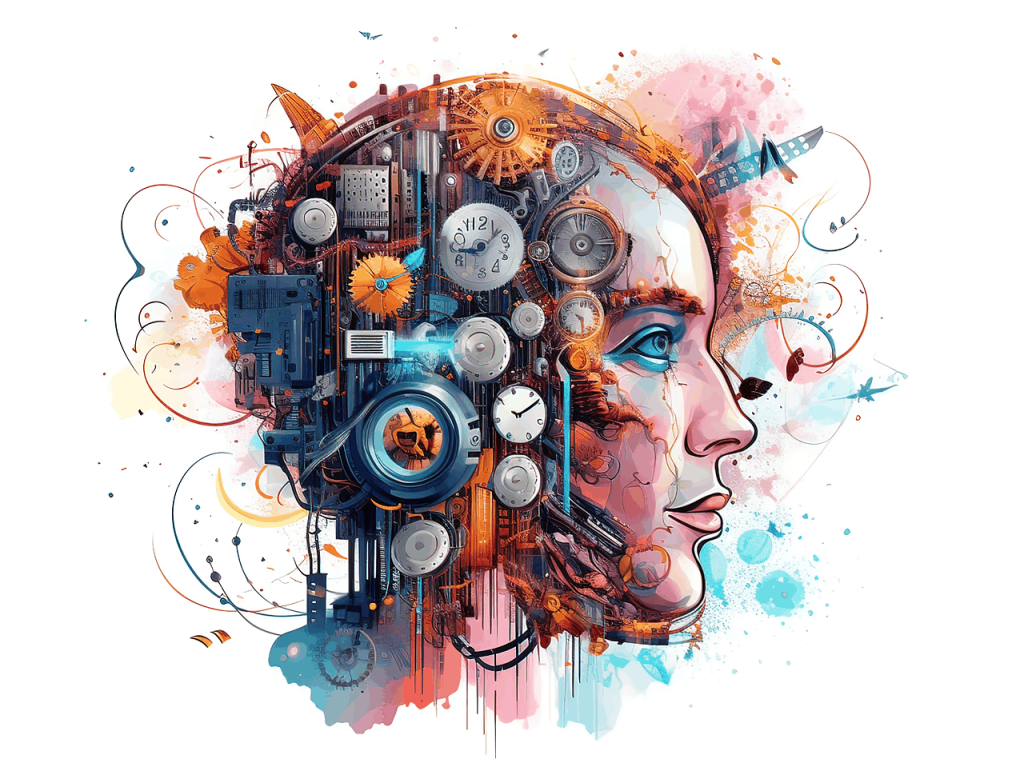The human mind is a complex and dynamic system, capable of incredible feats of cognition, emotion, and creativity. It processes vast amounts of information from the external world while simultaneously reflecting on internal thoughts and emotions. The mind is adaptable, able to learn and grow through experience, and it demonstrates remarkable plasticity, reorganizing itself in response to new challenges or environments. At its core, the human mind is driven by curiosity, constantly seeking understanding, meaning, and connection, while balancing reason and emotion to navigate the complexities of life.

The human mind also operates as a complex system of interconnected processes that manage thoughts, emotions, memories, and sensory input. It functions as both a biological and cognitive system, shaped by genetics, experience, and environment. Here’s a brief analysis of how the mind operates within a systems framework:
1.Unconscious Processes
Many mental operations occur below the level of conscious awareness. The unconscious mind stores memories, drives, and instincts that influence behavior without direct awareness. It is a crucial part of the mind’s system, guiding reactions and decision-making based on deep-seated patterns.
2.Interplay Between Biology and Environment
– The mind does not function in isolation but is shaped by both internal biology (genetics, brain structure, hormones) and external factors (culture, upbringing, experiences). The system of the mind is, therefore, dynamic, constantly interacting with the environment to produce adaptive responses.
3.Decision-Making and Problem-Solving
The mind processes options, evaluates risks and rewards, and ultimately makes decisions through a combination of logical reasoning and emotional input. Problem-solving strategies are employed to overcome obstacles, drawing on past experiences, creativity, and critical thinking.
4.Social Cognition
Humans are inherently social beings, and the mind is equipped with mechanisms to understand and interpret social cues, emotions, and behaviors of others. This includes theory of mind (the ability to attribute mental states to others) and empathy, which enable cooperation, communication, and social interaction.
5.Adaptability and Plasticity
The mind is highly adaptive, capable of changing in response to new experiences. Neuroplasticity allows the brain to reorganize itself by forming new neural connections. This adaptability is crucial for learning new skills, recovering from trauma, and evolving in changing environments.
6.Perception and Sensory Integration
The mind gathers data from the external world via the senses—sight, sound, touch, taste, and smell—and integrates this information to create a coherent understanding of reality. This system helps individuals navigate their environment and react to changes in it.

7. Emotional Regulation
Emotions play a crucial role in the system of the mind, influencing decision-making, behavior, and interpersonal relationships. Emotional regulation occurs through feedback loops between the brain’s limbic system (which controls emotions) and higher-order processes in the prefrontal cortex (which manages reasoning and decision-making).
8.Metacognition (Self-Regulation)
The human mind has the unique ability to think about its own thinking. Metacognition allows for self-reflection, goal setting, and the monitoring of one’s cognitive processes. It is a regulatory system that helps optimize problem-solving, learning, and emotional responses by providing feedback on the effectiveness of one’s thought processes.The human mind takes in information through perception and uses cognitive mechanisms like attention, memory, and problem-solving to interpret and act upon that information. This system relies on both conscious and subconscious processes, where thought patterns are shaped by experience and knowledge
9. Memory and Learning
Memory functions as a subsystem, organizing past experiences into short-term and long-term memory. The brain consolidates and retrieves memories, using them to adapt to new situations and inform decision-making. Learning is the process by which the mind updates itself, continuously integrating new information into these memory systems.
10.Shifting Perspectives
Flexible thinking also allows individuals to view situations from multiple angles. For instance, when solving a complex problem, a person with a flexible mind can switch between different perspectives—thinking about how others might see the issue, considering alternative solutions, or even imagining entirely new frameworks for understanding the problem. This skill is essential for empathy, as it allows people to understand and relate to experiences that may differ from their own. In social interactions, the ability to adopt another’s point of view fosters better communication, collaboration, and conflict resolution.
11.Adapting to New Information
One of the core aspects of flexible thinking is the ability to revise one’s beliefs or strategies when faced with new evidence. Humans encounter fresh data all the time—whether through direct experiences, learning, or interactions with others. Cognitive flexibility enables the mind to process this information, reconsider earlier judgments, and update previous conclusions. This openness to change is key in fields like science, where hypotheses are constantly tested and re-evaluated based on new findings.
12. Handling Uncertainty
Life is full of unpredictability and change, and a rigid mindset can lead to stress, frustration, or stagnation in the face of such challenges. Cognitive flexibility allows people to cope with uncertainty more effectively by being open to multiple possibilities and being willing to adjust plans when necessary. Whether in personal life or professional environments, those who are able to “go with the flow” often find it easier to navigate complex, shifting situations and to innovate in response to unexpected obstacles.

13. Learning New Skills
The ability to learn new skills is closely tied to thinking flexibility. As the brain is exposed to new tasks or environments, it needs to break free from previous patterns and habits in order to adapt to novel situations. This flexibility is especially evident in young children, whose brains are still developing and are highly receptive to new information. However, even in adulthood, the brain’s capacity for neuroplasticity—its ability to reorganize and form new neural pathways—demonstrates that flexible thinking remains a lifelong process.
14.Building Resilience
Cognitive flexibility also plays a major role in psychological resilience. Life’s inevitable setbacks—whether personal, professional, or societal—often require individuals to rethink their goals, expectations, or coping strategies. Those with flexible thinking are better equipped to bounce back from failure or disappointment, as they can adapt their mindset, reevaluate the situation, and find new ways to move forward. Rather than being paralyzed by adversity, they view challenges as opportunities for growth and learning.
15.Thinking Flexibly
Thinking flexibility, also known as cognitive flexibility, is one of the most remarkable capacities of the human mind. It refers to the ability to adapt one’s thinking in response to changing circumstances, new information, or unexpected challenges. Rather than being rigid in thought patterns or clinging to a single approach, flexible thinking allows individuals to shift perspectives, modify strategies, and embrace new ideas.
This flexibility is crucial for problem-solving, creativity, learning, and navigating the complexities of life. Thinking flexibility is a fundamental human trait that underpins adaptability, creativity, problem-solving, and emotional resilience. By allowing people to shift perspectives, embrace new ideas, and adjust to changing circumstances, flexible thinking helps individuals thrive in a complex, ever-changing world. Whether navigating the uncertainties of daily life, engaging in creative endeavors, or learning new skills, cognitive flexibility is essential for growth and success.
To sum up
The human mind plays a central role in shaping every aspect of human life, guiding thoughts, decisions, and actions. It enables individuals to process experiences, solve problems, and plan for the future, allowing for growth and adaptation in an ever-changing world. The mind influences how people perceive themselves and others, fosters emotional understanding, and drives creativity and innovation. By integrating memory, learning, and reasoning, the mind helps individuals navigate relationships, make sense of their surroundings, and pursue personal goals, ultimately determining the course of their lives.
The mind is not static; it evolves continuously through learning, adaptation, and experience. Neuroplasticity, the brain’s ability to reorganize itself, highlights this adaptability, showing that even as we age, our mental framework can shift, learn new skills, and overcome trauma. Moreover, the mind’s emotional capacity provides depth to our interactions with the world, as feelings such as love, fear, joy, and sadness influence how we interpret situations and respond to challenges.
The conscious and unconscious layers of the mind together govern our daily lives, with the unconscious mind often driving instincts and automatic responses, while the conscious mind engages in deliberate thought. All of this reflects the incredible complexity of human cognition, making the mind a source of wonder, capable of both rationality and creativity, yet vulnerable to psychological conflict and stress



